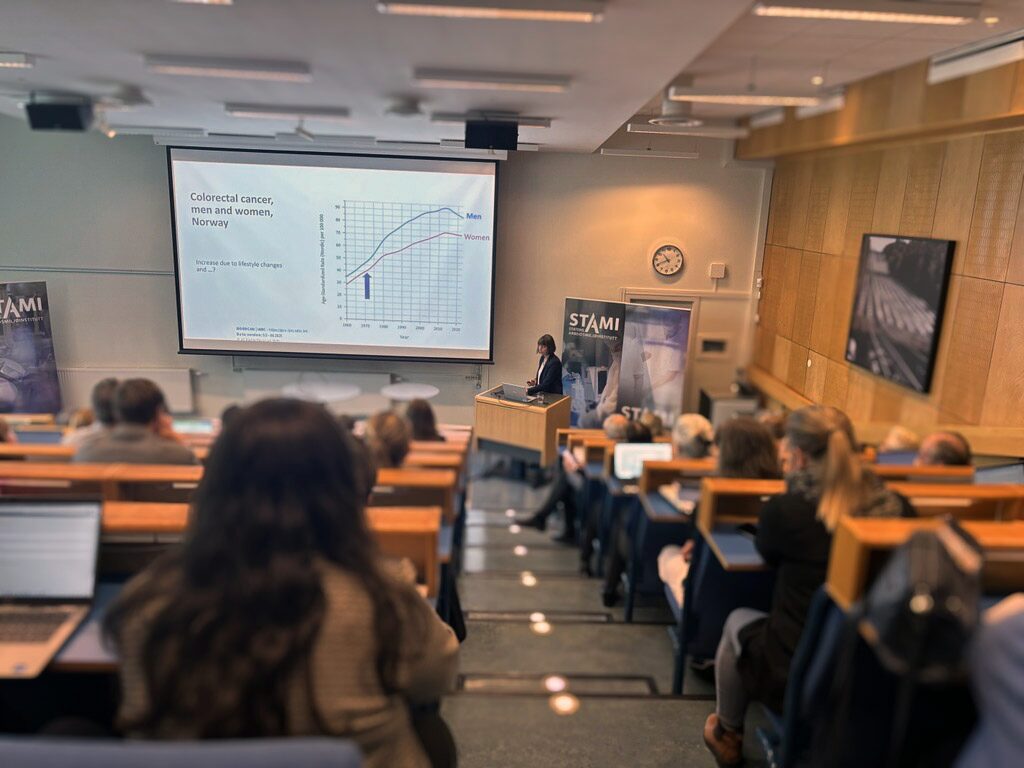
Director Therese Hanvold describes the meetings as both successful and important: “We have never before gathered so many central actors in the field to discuss opportunities and challenges together. This opens doors for new collaborations,” she says.
Hanvold emphasizes the need to further specify the collaboration – both to secure research funding, enhance knowledge development, and build strategic partnerships between the healthcare sector and the labor market. She also highlights the importance of close collaboration with international environments such as IARC (International Agency for Research on Cancer).
Joint effort is crucial
Director of IARC Elisabete Weiderpass thanked STAMI for the initiative of the meeting and stressed the importance of joint arenas for research on work-related cancer. She invited STAMI to further collaboration – including through a workshop or a dedicated session during IARC’s 60th anniversary in Lyon in 2026.
Giske Ursin from the Cancer Registry and FHI emphasized the need for closer cooperation between institutions: “Research on work-related cancer is challenging, and we need to work more together to succeed. Increased registration of occupation in the Cancer Registry will be an important step to strengthen the knowledge base,” she said.
Important investment in knowledge and data
STAMI Director Therese Hanvold describes the conference as a starting point for STAMI’s further work with work-related cancer:
“The meetings have opened doors to new collaborations and clarified the need for better data and knowledge. To strengthen research moving forward, we are dependent on good registries for working hours and chemical exposures.”
From STAMI’s perspective, it is crucial to ensure information about occupation in cancer registration in Norway. However, to strengthen research on work-related cancer, better data on exposure conditions is also needed.
Hanvold points out STAMI’s focus on building national registries for, among other things, working hours and chemical exposures in the labor market:
“These registries will provide a unique foundation for linking data and developing knowledge about causes and preventive measures, so that we can reduce the burden of work-related cancer in Norway. At the same time, research alone is not enough – we must communicate the knowledge in a way that makes it understandable and useful for those who will use it.”
The conference also marked a continuation of STAMI’s work within the Roadmap on Carcinogens, a European initiative launched in 2016 to reduce exposure to carcinogens at work.
The partnership brings together the European Commission, employers’ and workers’ organisations, national authorities, and research institutions to raise awareness and share knowledge.
Through this collaboration, STAMI has contributed to translating and verifying the European website stopcarcinogensatwork.eu, which offers accessible information on carcinogenic substances, high-risk occupations, and preventive measures – now available in Norwegian.
Read more about the Norwegian version of the website here: Norwegian version of European website on carcinogens launched.
Strengthening international research collaboration
Lead Research Professor Shan Narui, of STAMI’s Group for Occupational Toxicology, says the next step is to strengthen international collaboration through a new research consortium:
“As a follow-up to the successful meetings on work-related cancer held at STAMI on 25–26 September 2025, we are now in the process of establishing an international research consortium on work-related cancer. The consortium will build on the recommendations from the September meetings and continue this important work in the years to come,”
Core partners in this consortium include STAMI (Norway), INAIL (Italy), NRWCE (Denmark), INRS (France) and BAuA from Germany in addition to international researchers interested in work-related cancer.
STAMI has also taken initiative to propose a PEROSH network on work-related cancer.
